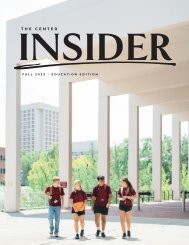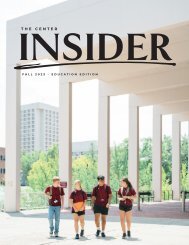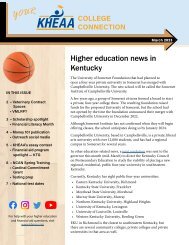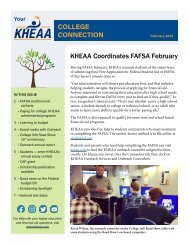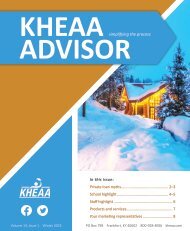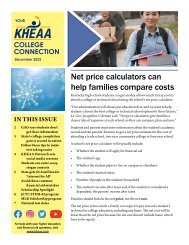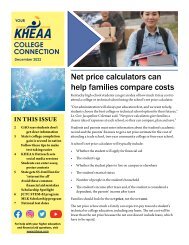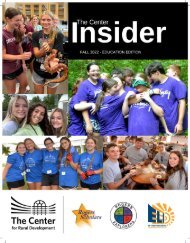AL - Counselor Connection - May 2022
You also want an ePaper? Increase the reach of your titles
YUMPU automatically turns print PDFs into web optimized ePapers that Google loves.
<strong>May</strong> <strong>2022</strong><br />
<strong>Counselor</strong><br />
<strong>Connection</strong><br />
KHEAA publishes the <strong>Counselor</strong> <strong>Connection</strong> to share information<br />
about student financial aid, college preparation and college planning.<br />
Comments and suggestions are always welcome. Please send them to<br />
publications@kheaa.com.<br />
KHEAA–Alabama<br />
PO Box 798, Frankfort, KY 40602-0798<br />
800-928-8926<br />
www.alstudentaid.com<br />
publications@kheaa.com
Students have different<br />
options after high school<br />
Many students think of education after high school as the<br />
traditional four-year college degree.<br />
Education after high school includes technical training and<br />
two-year associate’s degrees.<br />
Two-year degrees can prepare students to continue at a<br />
four-year school, but they can also lead directly to a job<br />
in the workforce. Diplomas and certificates in specialized<br />
skills give students the knowledge they need to compete for<br />
good jobs in industry and other careers. These programs<br />
usually take six to 18 months to complete.<br />
Alabama students can tap into numerous sources of<br />
financial aid to pay for whatever level of education they<br />
want to pursue.<br />
The Alabama Commission on Higher Education (ACHE)<br />
administers the Alabama Student Grant and the Alabama<br />
Student Assistance Grant. The Alabama Community<br />
College System offers several financial aid programs for<br />
students attending public two-year colleges.<br />
The financial aid office of the school students plan to attend<br />
will help students understand these and other aid programs.<br />
Alabamians who choose military service can still continue<br />
their education. All branches of the armed forces have<br />
education options for service members while they’re in<br />
uniform or after their discharge. Service members should<br />
contact their unit educational office to discuss student<br />
aid options. National Guard members can take advantage<br />
of the Alabama National Guard Educational Assistance<br />
Program, administered by ACHE.<br />
<strong>Counselor</strong> <strong>Connection</strong> | <strong>May</strong> <strong>2022</strong><br />
KHEAA schedules social media<br />
sessions for June, July, August<br />
KHEAA Outreach has scheduled six Facebook and Twitter<br />
events for June through August.<br />
The schedule is:<br />
June 6: Jumping Into Summer: ACT Resources, Facebook<br />
June 20: Jumping Into Summer: Tips and Tricks for the<br />
ACT, Twitter<br />
July 5: Summer Blast: College Choice Hot List, Facebook<br />
July 18: Summer Blast: Cooling Off on Campus, Twitter<br />
Aug. 1: Beating the Heat: Gearing Up for Fall, Facebook<br />
Aug. 15: Beating the Heat: No Stress Seniors Twitter<br />
All sessions begin at 2 p.m. Central.<br />
The links are:<br />
www.facebook.com/KHEAA/<br />
www.twitter.com/KHEAA/<br />
CareerOneStop helps students<br />
with planning for their careers<br />
The college planning website CareerOneStop offers<br />
features to help students learn about different careers.<br />
Students can take a survey that matches their interests with<br />
suitable careers. They can also view a comprehensive list<br />
of careers, complete with job descriptions, required skills<br />
and average salaries. Students can find out how much<br />
education they will need after high school to pursue the<br />
career of their choice.<br />
CareerOneStop also teaches students how to develop a<br />
résumé.<br />
1
Knowing their learning<br />
style can help students<br />
One helpful thing for students to know is their primary<br />
learning style — the way they’re most comfortable<br />
learning.<br />
There are different learning style assessments, but one of<br />
the most widely used is the Visual-Auditory-Kinesthetic<br />
(VAK) model.<br />
• Visual learners tend to take detailed notes, find<br />
something to watch if they get bored and like to see<br />
what they’re learning.<br />
• Auditory learners prefer to learn by hearing and<br />
reading aloud. They’ll hum or talk to themselves or<br />
others if they’re bored.<br />
• Kinesthetic learners learn better by touch and will<br />
tinker with something or move around when they’re<br />
bored.<br />
Students can find free online tests to help them determine<br />
their learning style. They might use different learning<br />
styles in different situations, but they’ll probably have<br />
a primary learning style with which they’re most<br />
comfortable.<br />
Good instructors will use techniques that involve all<br />
learning styles so all students are engaged in class.<br />
Students will be comfortable with activities geared toward<br />
their primary learning style, and they’ll become more<br />
comfortable with the other learning styles by using them.<br />
The more students are aware of their learning style and the<br />
instructor’s teaching style, the better students can shape<br />
their studying to do well in every class.<br />
Scholarship Spotlight<br />
MG Benjamin J. Butler<br />
Century Division Scholarship<br />
Eligibility: Must be an active or former<br />
member of, be a direct lineal descendant<br />
of or have been adopted by, or be<br />
acknowledged by the Defense Enrollment<br />
Eligibility Reporting System as a dependent of a member<br />
of the U.S. Army, 100th Infantry Division or any of its<br />
successor designations; be pursuing a four-year degree<br />
at an accredited college or university; be a Junior ROTC<br />
member and a National Honor Society member; be a high<br />
school graduate; have at least a 2.5 GPA; be involved in<br />
extracurricular, community and/or military activities;<br />
and submit ACT and/or SAT score, high school or college<br />
transcripts, honors and awards received, two signed letters<br />
of recommendation from non-family members, and a<br />
signed, typed essay of 250 words on the subject of how<br />
this scholarship will help the applicant achieve their goals.<br />
Renewable.<br />
Award: At least $1,000<br />
Number: Varies<br />
Deadline: June 15<br />
Contact: The Association of the Century Inc., Attn:<br />
Century Division Scholarship Committee, PO Box 34393,<br />
Louisville, KY 40232<br />
<strong>Counselor</strong> <strong>Connection</strong> | <strong>May</strong> <strong>2022</strong><br />
2
State scholarships help<br />
students earn dual credit<br />
An additional $5 million awarded by the Alabama<br />
Legislature for dual enrollment opportunities at Alabama’s<br />
community colleges will continue to increase the number<br />
of students who benefit from college classes while still in<br />
high school. In many cases, high school students graduate<br />
with an associate degree’s before or shortly after earning<br />
their high school diploma.<br />
Last year, funds approved by the legislature were used<br />
to help expand dual enrollment scholarships to high<br />
school students interested in taking college-level science,<br />
technology, engineering and math courses through their<br />
local community college.<br />
The increase in funds aligned with an increase in<br />
enrollment. In fall 2021 when the scholarships were<br />
first announced, 16,462 students took advantage of dual<br />
enrollment opportunities through Alabama’s community<br />
colleges. That was a 15.2% increase from fall 2020.<br />
Since 2015, there has been a more than 65% increase<br />
in dually enrolled high school students at Alabama’s<br />
community colleges. Dual enrollment gives Alabama’s<br />
high school students access to college-level classes that<br />
apply to credit in both high school and college at the same<br />
time. Unlike AP honors classes in high school, a student’s<br />
grades for dual enrollment classwork are the only factor in<br />
determining whether the student receives full college credit<br />
for the class.<br />
The dual enrollment classes are delivered through a variety<br />
of methods, including high school students attending the<br />
local college in-person or online or through a college<br />
instructor’s traveling to the local high school or career<br />
center to teach.<br />
Dual enrollment scholarships at Alabama’s community<br />
colleges cover 22 science, 18 computer science and 17<br />
math classes and more than 450 career pathway courses.<br />
For students at participating high schools, scholarships are<br />
available for two classes per student, per semester during<br />
the high school academic school year in the fall and spring<br />
and up to four classes during the summer term if their high<br />
school district allows summer classes.<br />
The scholarships cover tuition, fees and textbooks.<br />
Students must generally have a 2.5 GPA in academic work<br />
to qualify for the dual enrollment scholarships. More<br />
information is available at students’ local community<br />
college.<br />
<strong>Counselor</strong> <strong>Connection</strong> | <strong>May</strong> <strong>2022</strong><br />
3
ACT National Test Dates<br />
Test Date Registration Deadline Late Registration<br />
July 16, <strong>2022</strong> June 17, <strong>2022</strong> June 24, <strong>2022</strong><br />
Sept. 10, <strong>2022</strong> Aug. 5, <strong>2022</strong> Aug. 19, <strong>2022</strong><br />
Oct. 22, <strong>2022</strong> Sept. 16, <strong>2022</strong> Sept. 30, <strong>2022</strong><br />
Dec. 10 <strong>2022</strong> Nov. 4, <strong>2022</strong> Nov. 11, <strong>2022</strong><br />
Feb. 11, 2023 Jan. 6, 2023 Jan. 20, 2023<br />
April 15, 2023 March 10, 2023 March 24, 2023<br />
June 10, 2023 <strong>May</strong> 5, 2023 <strong>May</strong> 19, 2023<br />
July 15, 2023 June 16, 2023 June 23, 2023<br />
SAT National Test Dates*<br />
Aug. 27, <strong>2022</strong> TBD TBD<br />
Oct. 1, <strong>2022</strong> TBD TBD<br />
Nov. 5, <strong>2022</strong> TBD TBD<br />
Dec. 3, <strong>2022</strong> TBD TBD<br />
March 11, 2023 TBD TBD<br />
<strong>May</strong> 6, 2023 TBD TBD<br />
June 3, 2023 TBD TBD<br />
* Anticipated<br />
<strong>Counselor</strong> <strong>Connection</strong> | <strong>May</strong> <strong>2022</strong><br />
4




